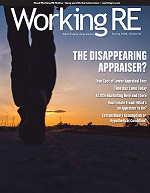 |
Why Not Earn And Learn > How to Support and Prove Your Adjustments (Earn 7 Hours Online CE) |
TAF Considers Skipping Experience Requirement
By Isaac Peck, Editor
The Appraiser Qualifications Board (AQB) recently released an Exposure Draft (May 18) that considers rolling back the bachelor’s degree requirement for Certified Residential appraisers. (See AQB Proposes Alternative to College Degree Requirement.)
This is big news in itself. However, a careful reading of the proposal indicates a subtle change in the requirements that may have even farther reaching effects, and that some appraisers will find shocking.
In addition to the roll back of the bachelor’s degree requirement, the AQB exposure draft is also proposing a path that would allow a would-be appraiser to achieve the Certified Residential credential without ever having worked as a trainee or an appraiser.
Under the AQB’s proposal, practicum coursework would be developed that could account for up to 100% of the experience requirements needed to earn a Certified Residential or Certified General credential.
While this coursework could not be used to waive the experience hours needed to achieve a Licensed Residential credential, the proposal would allow a would-be appraiser to jump straight to the Certified Residential credential using the practicum coursework as a substitute for 100% of the 2,500 experience hours required for the Certified Residential credential.
In other words, a would-be appraiser would be able to enter the appraisal profession as a Certified Residential appraiser without ever having worked in the field.
According to the exposure draft, the practicum coursework, or what the AQB is now referring to as “Practical Applications” coursework, would consist of a series of four three-hour classes and “each segment could involve two classes utilizing case studies as a means of providing practical experience.” The AQB envisions coursework that provides real-world, hands-on experience that includes basic practical applications of the appraisal process as well as case studies that require completion of appraisals for more complex properties. To accomplish this, the coursework would need to include hypothetical properties with all necessary subject property and market data, according to the draft.
AQB Perspective
Working RE contacted John Brenan, Director of Appraisal Issues at The Appraisal Foundation (TAF) and Joe Traynor, Chair of the AQB, about the proposed changes. Traynor explains that starting last year, the AQB has been evaluating the experience requirements and how would-be appraisers can gain that experience. “We’ve been hearing for quite a while that trainees are having a very difficult time finding supervisors who are willing to train them. Practicing appraisers have been widely resistant to take on a trainee for a number of reasons, including the unwillingness of lenders/AMCs to accept trainees even being listed on an appraisal report, and the fact that supervisors must inspect every property with the trainee (in most states). The fee structure in general on residential mortgage appraisals has also been an obstacle. Based on what we’ve heard from a lot of different people, this has made the relationship not financially feasible for many appraisers,” says Traynor.
(story continues below)

(story continues)
To address these challenges, Traynor reports that the AQB has been seeking feedback from the industry’s stakeholders at its public hearings and by issuing a Discussion Draft in February 2016, and now its current Exposure Draft in May 2016. “The current experience model in the appraisal industry now has been in place for over 25 years, ever since the AQB was formed at the direction of FIRREA. The current trainee-supervisor model is even more dated than that and likely extends back to the 1930s when professional appraiser organizations were first formed,” says Traynor.
What the AQB’s exposure draft aims to do then, is to explore other ways that potential appraisers might be able to gain experience outside of this traditional model. “The idea behind an exposure draft is simply to expose concepts for comments and feedback. This exposure draft in particular, more so than other ones, has a lot of out the box thinking in it. I don’t know where it ends up. We are just trying to raise the idea that there are other ways appraisers can gain the experience necessary to participate in the profession in a competent and compliant fashion,” reports Traynor.
Practical Applications Coursework
In terms of what could potentially serve as an alternative to the traditional experience model, Traynor explains that the Exposure Draft details a series of different classes a trainee would be required to take which some have affectionately described as “case studies on steroids.”
John Brenan, Director of Appraisal Issues at TAF, says that based on the feedback received by the AQB, the final model might also include internships with colleges and universities. “The Practical Applications coursework that is being proposed here would involve extensive case studies and require trainees to produce USPAP compliant appraisal reports. The Final Exams would also include preparing USPAP compliant appraisal reports. So this is not is not a way for potential appraisers to avoid experience, it is a way for would-be appraisers to get that appraisal experience in a different way. Students would need to demonstrate that they can competently complete an appraisal before becoming an appraiser,” says Brenan.
(story continues below)
(story continues)
In terms of who will be developing the Practical Applications coursework, Brenan and Traynor acknowledge that taking practicum coursework to account for 50% of one’s experience requirements has been an option for appraisers since 2008, but so far the economic feasibility of developing such a program has prevented anyone from offering such courses. “If this concept sticks, it may be that the AQB may have to assist in developing the coursework to make it feasible. It might be similar to a national USPAP course where the basic framework is developed by the AQB and the provider can fill in the rest of it. These will be questions we can explore in future discussions,” says Brenan.
Importance of Feedback
Brenan stressed the importance of stakeholder feedback. “The idea behind an exposure draft is simply to expose concepts for comments and feedback. If the feedback says this is too far, that it’s going overboard, it’s highly likely that the board will dial it back a little and adjust its approach,” says Brenan.
Appraisers and other stakeholders have been very interested in the AQB’s examination of these issues and Brenan reports that the AQB takes all feedback it receives seriously. “The AQB is very serious about obtaining the kind of feedback it has been getting. The AQB carefully reads every comment it has received and takes it into consideration. I highly encourage your readers to provide their thoughtful comments to us. We want to hear from them,” says Brenan.
Feedback Due before Friday (June 17th)
Appraisers are encouraged to submit their (concise, considered and spell-checked) comments to the AQB before the June 17, 2016 deadline: Email: aqbcomments@appraisalfoundation.org or mail to: Appraiser Qualifications Board, The Appraisal Foundation, 1155 15th Street, NW, Suite 1111, Washington, DC 20005.
New Online CE – 7 Hours
How To Support and Prove Your Adjustments
Presented by: Richard Hagar, SRA
“Why wasn’t this taught years ago?” – Jackie Henry
Do you have the proper support for your adjustments? Stop taking the same old CE courses and learn proven adjustment methods with instructor Richard Hagar, SRA. Fannie Mae states that the number one reason appraisals are flagged is the “use of adjustments that do not reflect market reaction.” Stay out of trouble with Fannie Mae, your state board and your AMC/lender clients with solid, supportable adjustments. Up your game, avoid time-consuming callbacks and earn approved CE today!
How to Support and Prove Your Adjustments
Sign Up Now! $119 – 7 Hrs. Approved CE
(OREP Member Price: $99)
About the Author
Isaac Peck is the Editor of Working RE magazine and the Director of Marketing at OREP.org, a leading provider of E&O insurance for appraisers, inspectors and other real estate professionals in 49 states. He received his master’s degree in Accounting at San Diego State University. He can be contacted at Isaac@orep.org or (888) 347-5273.
Send your story submission/idea to the Editor: isaac@orep.org




by Baggins
Jump the experience requirement o 4000 hours, 3 years minimum. Release the college requirement. And if non appraisers get credit via testing and such, I want to be able to jump to managing broker without having to work under anyone else. Fair is fair. The arguments around experience requirements being revisited at this time, before a single 10k/20k fine for violations of appraiser independence rules, well it’s the cart before the horse argument. Daily offenses and somehow that means we need more appraisers who won’t make waves regarding bonafide ethical issues, and bring those issues to light. Out with the old and in with the new. Anything that can be done to pander to major lender interests right?
-by stylec
I think they’re on the right track. The burden of advancing appraiser’s careers should be on the foundation, not on other appraisers. (Potential) supervisory appraisers have no reason to take on trainees and are in no way regulated…we have no idea how experienced, qualified or hands-on they are. Classroom hours (combined with in-field hours), led by a team of professionals, could help create consistency and credibility within our practice where currently there is none. And requiring applicable college courses (finance, econ, real estate, construction, etc) would lend more relevant knowledge than a non-specified degree. I’ve worked steadily with an AR lic for almost 20 years but would love to expand into commercial appraising. I will not be able to advance my career without some changes to the clearly outdated requirements. Please give their ideas a chance to evolve in real-world scenarios. Nothing in this industry is set in stone anyway.
-by Ron
I believe that Licensed, NO experience contributed to the housing crash. After the last whining by lenders, hundreds were approved to work without experience. They gobbled up business for low fees, and after a while, they thought they knew what they were doing. I guess money & power trumps disasters.
-by Doug
AQB a few years ago: We are looking to become the highest level of processionals by setting a reasonable barrier for entry commensurate with other types of professionals along with good quality and quantity of hands-on training in a local markets from actual peers. We know that this solid foundation for the profession going forward will upset the current ecosystem for a while, but that the free market will react in time and the appraisal profession will be better for it in years to come.
AQB now: Umm… just kidding… on all of that. The free market gave us a dirty look and the fetal position seems like a pretty good idea.
-by taco
I guess when someone said there are not enough appraisaers, our fearless leaders panicked. It took me years to learn how to measure a complicated 2nd story home, to understand why some items in the home brought value and others did not, etc.. etc. etc. 1st they make it extremely difficult to get an appraisers license, now they want to make it easy, how about some where in the middle, make an applicant work for a license somewhat.
-by Mark
I seems that the AMC need appraisers who will work for low fees. Nothing like a newbe with little education and no experience. With some amc all they need to do is take pictures and the amc reviewer will do the rest.
-by jd1958
So you have someone who is “book smart” completes all the necessary courses and POOF! Your now a Certified Residential or a Certified General R.E. Appraiser?!! Really? I can see the economy tanking once again. The education part is one thing. Books cannot teach you what to look for in, under around a home. Only practical experience can teach someone that. NOTHING else!!!!!!
-by John Ford
Becoming a certified appraiser without ever inspecting a home is one of the most remarkable ideas that I have ever heard. I wonder if we could have neurosurgeons qualified the same way.
-by David Brauner
Hey guys- that language about punctuation and such in the story is from me, not TAF. It’s the same advice I give insureds when writing summaries and rebuttals. I want your voices to be listened to and taken seriously and that does not happen if your writing is riddled with mistakes, typos, etc. I think (and I don’t know for sure) that an incoherent response is much easier to dismiss.
-by Deb
wow how nice for them….it took me all that $$$ grief, stress, and low wages…. loss of business when I was not yet a CR, and all the BS …..and still cannot making a decent level….go ahead let them do the easy way – maybe one of them will the appraiser doing the appraisal on your house……..
-by Edd Gillespie
Rolling back formal education requirements is a huge mistake, but even thinking of rolling back the experience requirements compounds the error exponentially.
Our industry suffers from a lack of understanding that impacts not only our product, but the very image of the profession and its priority of earning the public trust. And that because of objections those appraisers without formal education and a very few who find their formal education worthless in education.
A large part of the problems appraisers and the industry face are directly linked to a lack of education.
The formal education requirement will enhance appraiser credibility and give appraisers a “dog in the hunt” that will result in a cohesiveness and cooperation among appraisers to stand strong against the powers that are bringing us down and that just to avoid the time effort and expense of education.
What a shame.
What a shame
-by Dan
Removing the in the field training completely is absolutely ridiculous. There is no way a person can enter this field and be even remotely competent without real world experience. I would cringe to think of what a report would look like that was completed by someone with only twelve hours of class room case study. Would you want this newly certified appraiser completing the appraisal on your own home? As an appraiser we run into new situations on almost a weekly basis, there is no way to prepare a new appraiser to deal with these situations without true real world field experience. The real answer to the problem is to demand that appraisers are paid fairly for their work and they will start to train again. Trainees had no problem finding mentors prior to the HVCC and then Dodd Frank, if the AMC’s were forced to pay a decent fee it would not be a problem now.
-by Doug
Did they already forget the reason that most of this was put into place to begin with? Roll any of this back and the appraisal industry will once again be blamed when bankers and investors get greedy. It won’t be hard for a lawyer to make the parallel that this is similar to giving somebody a law license if they just catch up on all of the seasons of Boston Legal or Ally McBeal, so of course the ill-qualified, trained and taught appraisers are the issue, yet again.
-by Joseph
I feel it is sad commentary on our profession, or those working therein, that you had to state that our comments to the AQB should be “concise, considered and spell-checked.”
-by Edd Gillespie
Observant of you to the point of profound. But why not include sentence structure and punctuation. Thousands of appraisers are trained only to fill blanks and make check marks. Maybe TAF should come up with a response form that requires only those then spelling wouldn’t be worth mentioning.
However, rolling back education requirements begs the question of what do about poorly written communications.
-